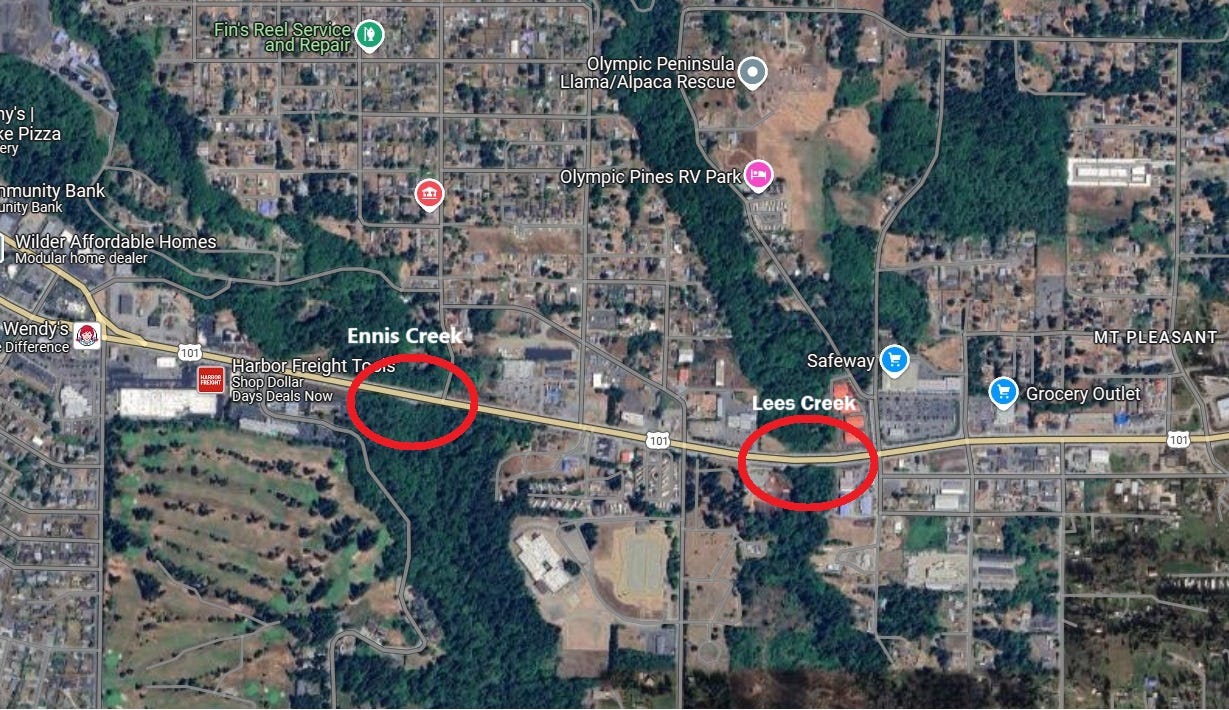Traffic set to move slower than local economy
Locals brace for two years of highway closures and construction
The traffic headaches of replacing culverts on 101 are wrapping up east of Sequim, but they aren’t going away — they’re just swimming upstream to Port Angeles. The Tumwater Creek fish barrier removal project on US 101 will begin in January, closing the highway from March through May. Traffic will be detoured via the Tumwater Truck Route. Pedestrians and bikes will need to use the 8th Street Bridge.
In February, work should begin on two more Highway 101 culvert replacement projects at Lees and Ennis Creeks. According to DOT Olympic Region Coordinator Steve Roark, “The work is being done ‘half at a time,’ so we’re going to build one half, and then shift traffic, and build the other half.”
Roark told the commissioners on Tuesday that construction has been modified to keep two lanes of traffic open at all times in each direction. “I would still anticipate some lag or some amount of delay as you move through those work areas,” he said.
Construction over Lees and Ennis Creeks should wrap up in October 2026.

Culvert replacement projects are the product of a federal court order won by the Northwest Treaty Tribes in U.S. v. Washington, which mandates the replacement of fish-blocking culverts under state highways.
Local and regional tribes argued that “they have suffered irreparable injury in that their Treaty-based right of taking fish has been impermissibly infringed. The construction and operation of culverts that hinder free passage of fish has reduced the quantity and quality of salmon habitat, prevented access to spawning grounds, reduced salmon production in streams in the Case Area, and diminished the number of salmon available for harvest by Treaty fishermen. The Tribes and their individual members have been harmed economically, socially, educationally, and culturally by the greatly reduced salmon harvests that have resulted from State-created or State-maintained fish passage barriers.”

A Seattle Times Watchdog article published earlier this year was critical of the project’s results and estimates it currently costs Washington taxpayers $1 million a day. While some efforts have successfully restored salmon, the article says many projects “have narrowly focused on fulfilling the terms of the court order and haven’t seized opportunities to prevent their investments from being ineffective or even worthless.”

The DOT presentation also revealed that the shoulders of Highway 101, the only arterial on and off the Peninsula, will be repurposed for bicyclists and pedestrians in a one-and-a-half mile stretch between Taylor Cutoff and Boyce Roads in Carlsborg. This is in addition to the four roundabouts planned for that stretch of highway.
The high transportation costs between Port Angeles and off-peninsula markets contributed to the McKinley Paper Mill closing last month. Locals in the industry estimate trucking expenses to cost $2 per minute. Additional roundabouts between the Hood Canal Bridge and Port Angeles only increase the costs of exporting locally-made products and bringing goods to residents.
When the DOT showcased the plans to the Board in March, Commissioner Mark Ozias said, "I'm someone who's generally a fan of roundabouts."
County engineer’s speed recommendations
A public hearing will be held on October 8th regarding citizen-requested speed limit changes for five Sequim-area roads. A resident had flagged a sixth, Evans Road, for sight distance issues, but County staff has already addressed that concern.
County Engineer Joe Donisi recommends a “network approach” for Gilbert and Gupster Roads in Carlsborg. That means a “blanket speed limit” would be applied to all roads in Carlsborg, similar to the City of Port Angeles. “We just set the speed limit at 25 in the Urban Growth Area [Carlsborg UGA] except for our collector roads.”
The roads exempt from the 25 mph speed limit would be Taylor Cutoff, Atterberry, Hooker, Carlsborg, and Mill Roads. Not only would this solve the speed limit issue for Gilbert and Gupster Roads, but it would also prepare for future growth in that area.
According to data collected, 85% of traffic traveled at 31 mph on Gilbert Road and 34 mph on Gupster (both have a posted speed limit of 35 mph). Gupster Road had only three accidents in the past ten years, and Gilbert Road had two (all accidents were non-injury).

Just under 1,000 cars a day travel on Lotzgesell Road between Hogback and Kitchen-Dick Roads. Data showed that 85% of cars travel 45 mph on that stretch (the speed limit is 45 mph). Donisi recommends leaving the speed unchanged until after the County redesigns the Voice of America Road (entrance to the Spit) and softens the 90-degree Kitchen-Dick/Lotzgesell corner into a sweeping curve.
Three Crabs Road is fairly wide open, has about 400 cars daily, and does not have sight distance issues. 85% of drivers travel at 35 mph, the posted speed. “There’s no topography on Three Crabs Road,” said Donisi. “For that reason, I’m going to recommend we keep it at 35 there.”
Commissioner Ozias asked about periodic flooding concerns on Three Crabs Road, which occurs when high tides and storms coincide. “We never really were able to show extreme damage that was done recurringly,” said Donisi about the County’s attempts to attract grant funding to address the flooding. “I think we’re going to have look at some other sources of funding,” said Donisi. Being a dead-end road with only local access presents grant funding challenges.
With the levee still under construction, Towne Road remains a cul-de-sac and has about 400 cars per day north of Woodcock Road (all information presented is for traffic volumes and speeds in both directions). Data collected from four counter locations show that the average speed for 85% of drivers is 37.5 mph (the posted speed limit is 35 mph). Specific counter locations showed 85% of drivers went 40, 33, 43, and 34 mph.
Towne Road remains a dead end since the levee is still closed (it is scheduled to open to traffic by the end of this month). Although data reveals that speeding is a problem, there are only two destinations for drivers on that stretch of Towne Road: the Dungeness Valley Creamery or the parking area for people wanting to walk on the levee. That means that most of the speeding drivers, presumably, are the people who have been vocal about keeping Towne Road closed — the residents who live there.
While Towne Road had two accidents attributed to sight distance in the past 25 years, three accidents have happened in the past 10 years (one injury accident and two non-injury accidents). Donisi recommends that Towne Road remain 35 mph from Old Olympic Hwy to Woodcock, reduce to 30 mph from Woodcock to the new levee, and reduce to 25 mph atop the levee until Sequim-Dungeness Way.
Dangerous intersection

Donisi reviewed ten years of data at the Old Olympic, Cays, and Macleay Roads intersection, which sees about 9,900 vehicles daily. Over the past ten years, 22 accidents have occurred (9 injury accidents, 13 non-injury accidents). However, 17 of those accidents were caused by drivers not stopping at the westbound Old Olympic Highway stop sign, which was upgraded to a flashing red sign. Two accidents were attributed to drivers not stopping for the eastbound stop sign at Macleay Road.
Donisi said that this data is part of a preliminary analysis, and he hopes to gather more information and compare it to countywide and statewide data.
Living near the dangerous intersection has been a nightmare for Sequim resident Patty Erickson.
“Imagine being sound asleep and suddenly hearing that sound you’ve come to know so well, running out to see if everyone is alright, and seeing your hard work destroyed. Or being out in the garden and same thing — you hear the familiar sound and, heart racing, you have to run and make sure your disabled son is ok, and your dogs. And then constantly calling for some help with the situation, and 20+ years later all you get is a flashing stop sign which stopped nothing. Then imagine the local government who ignores your safety concerns is the same government that raises your taxes.” — Patty Erickson






Jeff and team, have you looked into the money trail? Does the tribe bid on and receive County funds to work on the projects the commissioners approve? And does the tribe's construction business win the bids on county jobs? And do the tribes ' businesses pay the state the taxes it collects on fuel, liquor, and services (B&O), as other businesses are required to do?
This effort to improve fish passage is laudable, but a very small effort to solve a very large problem. I read a King County study on the benefits of these projects or lack there-of. The expected benefits were not realized and the study attributed that to a chemical used in tire production that is toxic to juvenile fish. The preservation of PNW fish stocks is so complicated that fish resource stewardship organizations are fighting each other. Of the many challenges facing the survival of our fish, it is hatcheries that loom largest. There are multiple points and counter points to hatchery production. I liken fish hatcheries to addictive drugs. There is an initial high / euphoria / large return of fish. The first hatchery return is great, the second is good, the third is fair the fourth not so great and that trend continues to plummet to a point where the only fix is to plant more hatchery fish. For too many reasons to explain here hatchery and wild fish populations are inversely proportional. More hatchery fish equals less wild fish. The most obvious problem, of many, with loosing wild fish is that they are genetically perfected for survival in their native habitats. Wild fish survive eating the flesh and spawn of other fish and insects and by instincts avoiding predation. Hatchery fish survive on food pellets provided by predators. Our best opportunity to learn about wild fish restoration via the Elwha River shed has been lost by again hatchery supplementation and the associated harms. The complexity of our fish stocks is so great that the only answer I have is fish and human populations are inversely proportional. More people equal less fish. More fish equal less people.